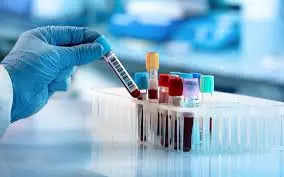
New Delhi: Blood Tests Measuring two specific fats, along with SwellingAccording to a study conducted on nearly 28,000 women, this technique can help predict the risk of women developing cardiovascular diseases over the next 30 years. women In the US, the test measures two fats in a blood sample, which are LDL, or ‘bad’. CholesterolAnd Lipoprotein(a)which is partly composed of LDL. Inflammation was measured by detecting levels of high sensitivity C-reactive protein,
When three measurements in a woman’s blood sample — inflammation, cholesterol and lipoprotein(a) — were analyzed together, the researchers found that women who had the highest levels were 2.6 times more likely to have serious adverse effects. cardiac eventWhich also includes heart attack.
This relationship was found to be even stronger shock The team of researchers, which also included researchers from Brigham and Women’s Hospital in the US, said women with high levels were 3.7 times more likely to have a stroke over the next 30 years.
They said the three measures may better predict the risk of major cardiovascular events over the next three decades than just one measure. These findings were published in the New England Journal of Medicine.
“We can’t treat what we can’t measure, and we hope these findings move the field closer to identifying even earlier ways to detect and prevent heart disease,” said study author Paul M. Ridker of Brigham and Women’s Hospital.
For the study, researchers analyzed blood samples and medical information from 27,939 healthcare providers living in the US who participated in the Women’s Health Study. The women had an average age of 55 years at the start of the study (1992-1995) and were followed for 30 years.
During the study period, about 3,660 women experienced a first-time major cardiovascular event, including heart attack, stroke or death from related causes.
Assessing cardiovascular risk due to all three parameters individually, the researchers found that women who had the highest levels of inflammation were 70 percent more likely to have a major cardiovascular event.
Women who had the highest levels of ‘bad’ cholesterol and lipoprotein (a) were 36 per cent and 33 per cent more likely to develop cardiovascular disease, respectively.
He said that although only women were studied for this research, the researchers expect to get similar results in men as well.
According to the researchers, studies in recent years have shown how high levels of inflammation can combine with fat to increase the risk of heart disease, which helps explain why lower levels are better.
Immune cells, which help the body repair wounds or infections, may also sense the accumulation of excess cholesterol in cells or become activated in response to plaque buildup and send inflammatory signals, he explained.
This creates a hyper-inflammatory environment where plaques can form, grow larger, or even burst — and lead to cardiovascular problems, the authors said.
Researchers said all three risk factors could be addressed with a combination of lifestyle changes and drug therapy.
He said studies have shown that reducing both cholesterol and inflammation significantly reduces the risk of heart attack and stroke.
The researchers said the new data strongly support earlier and more aggressive use of targeted preventive interventions, particularly among women who still have underdiagnosed and undertreated heart disease.